I’m always intrigued by bird behaviors, especially when it’s something new that I can’t explain or find in the literature.
In the spring during pair bond formation Western Grebes are well-known for long bouts of “mate feeding” where the male repeatedly dives and captures a fish and then delivers it to the female waiting on the surface. I’ve seen and photographed the behavior dozens of times. While both birds are on the surface the female begs loudly for food but when the fish is delivered she swallows it almost immediately and then when the male dives for another fish her begging stops until he resurfaces again.
But ten days ago at Bear River Migratory Bird Refuge I photographed a variation of this behavior that I had never seen before and can’t find described in the literature.
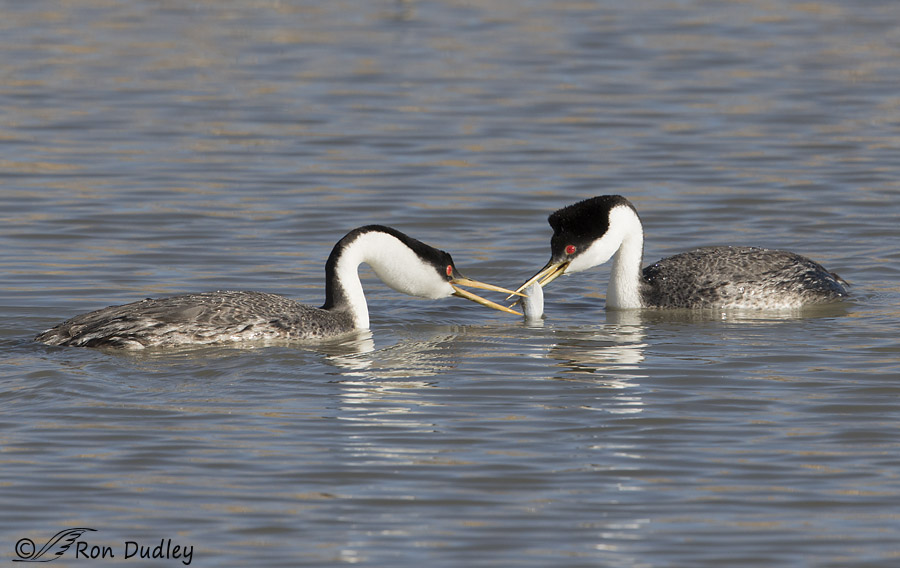
I believe the slightly larger male is the bird on the left. By the time I started snapping photos he had apparently already given the fish to the female on the right. When I’ve observed this behavior in the past the female has always swallowed the fish almost immediately but this time she gave it back to the male, as she’s doing here.
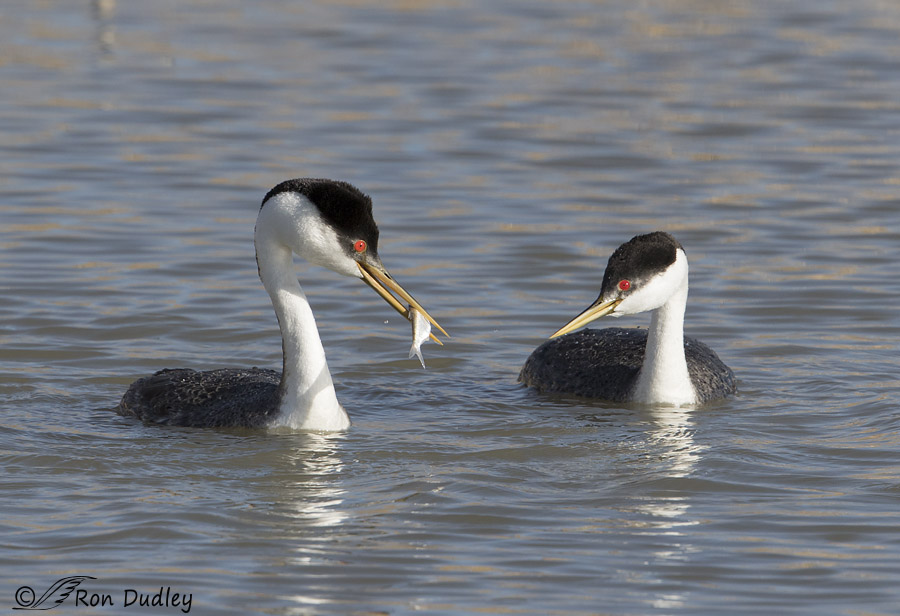
Here the male has the fish again.
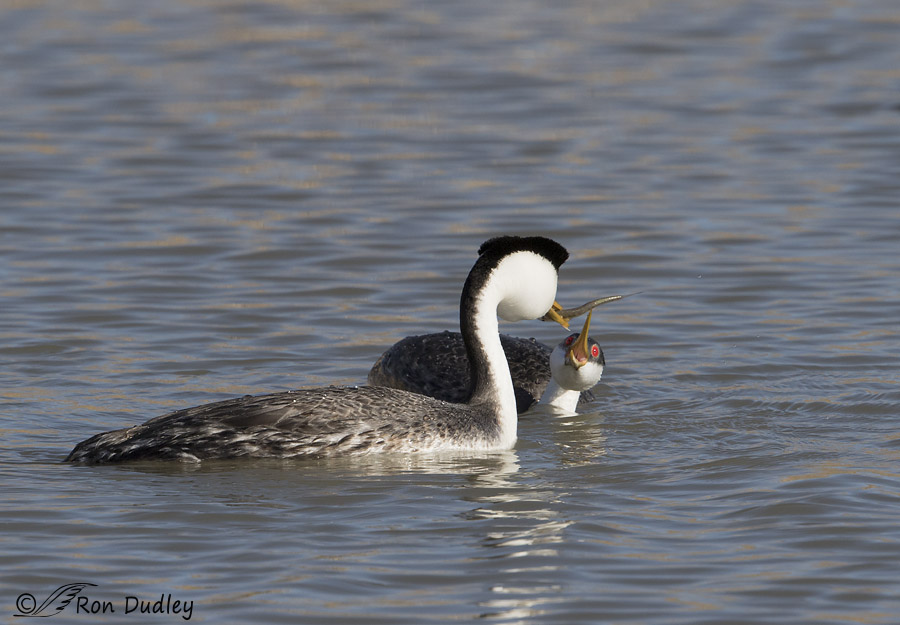
But then he gave it back to the female.
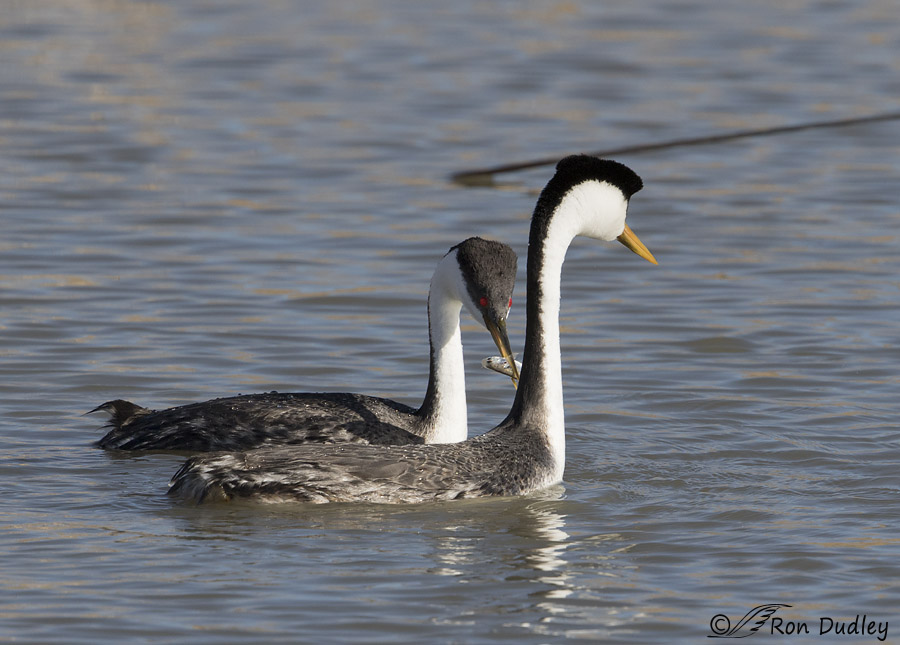
She held on to it for a moment…
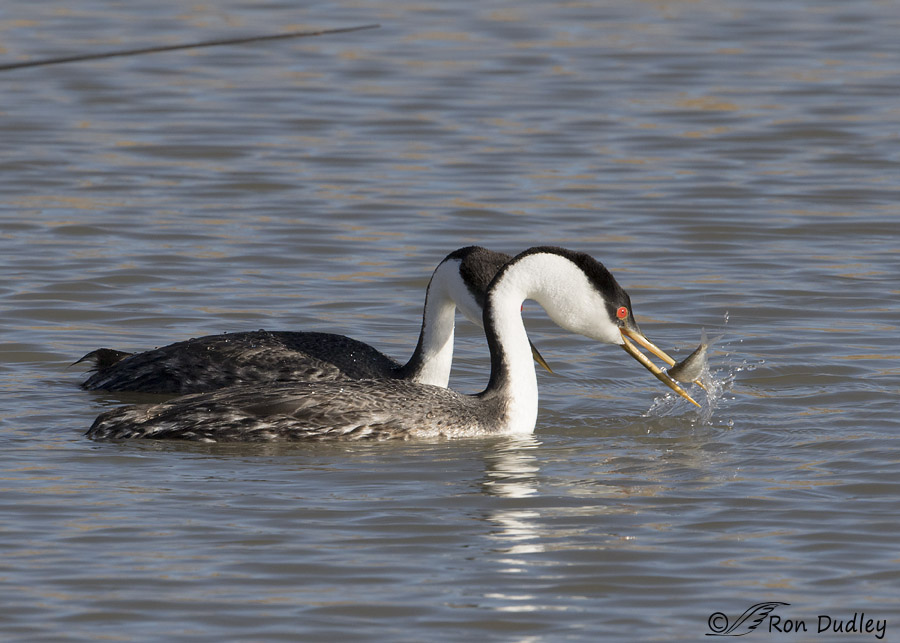
and then returned it to the male.
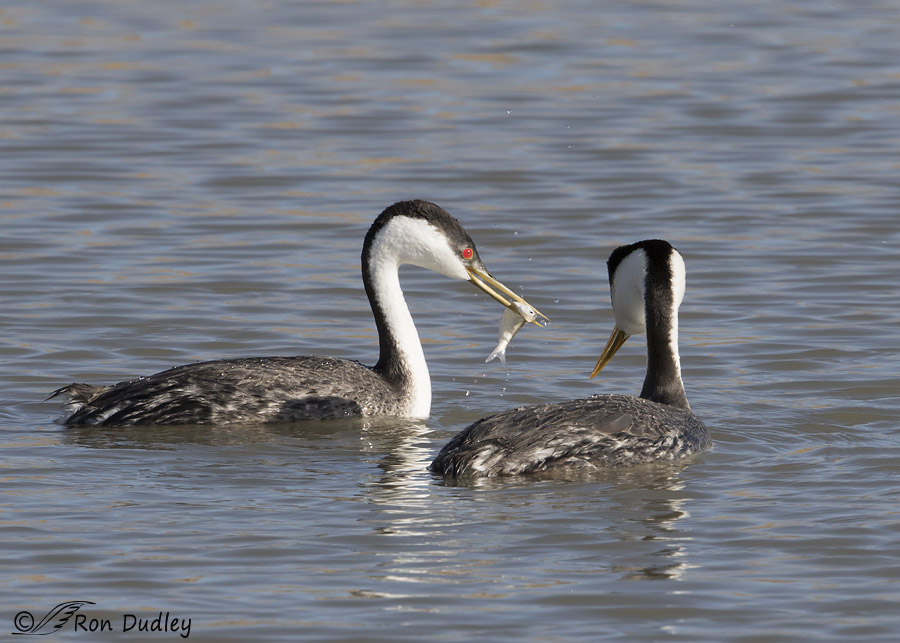
Then back to the female again.
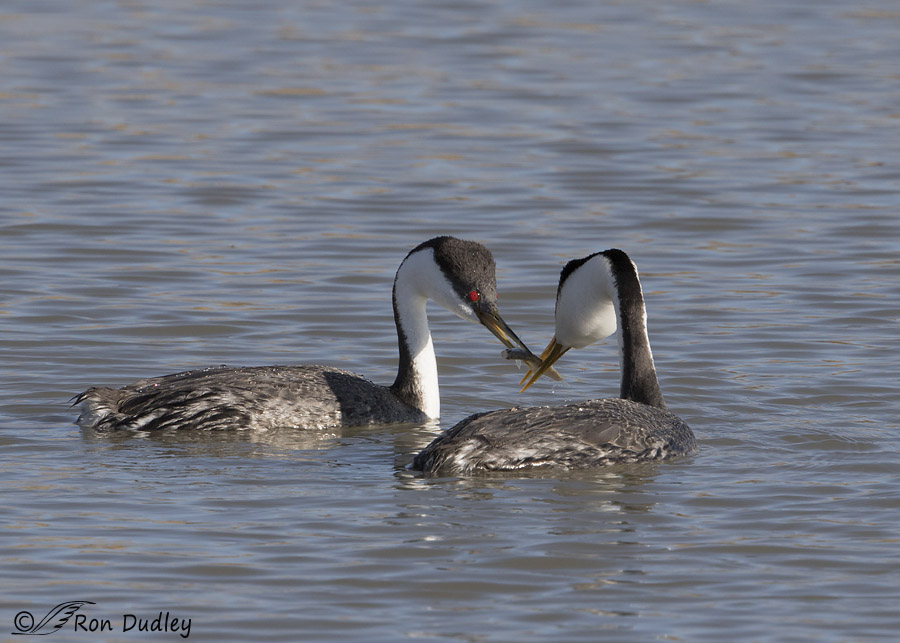
Then back to the male…
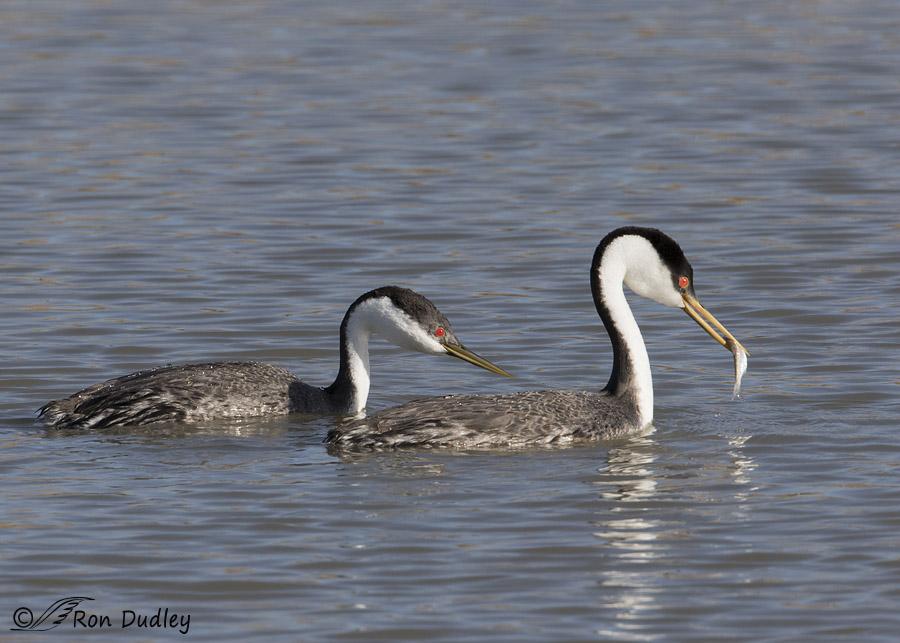
who apparently decided that if she didn’t want it…
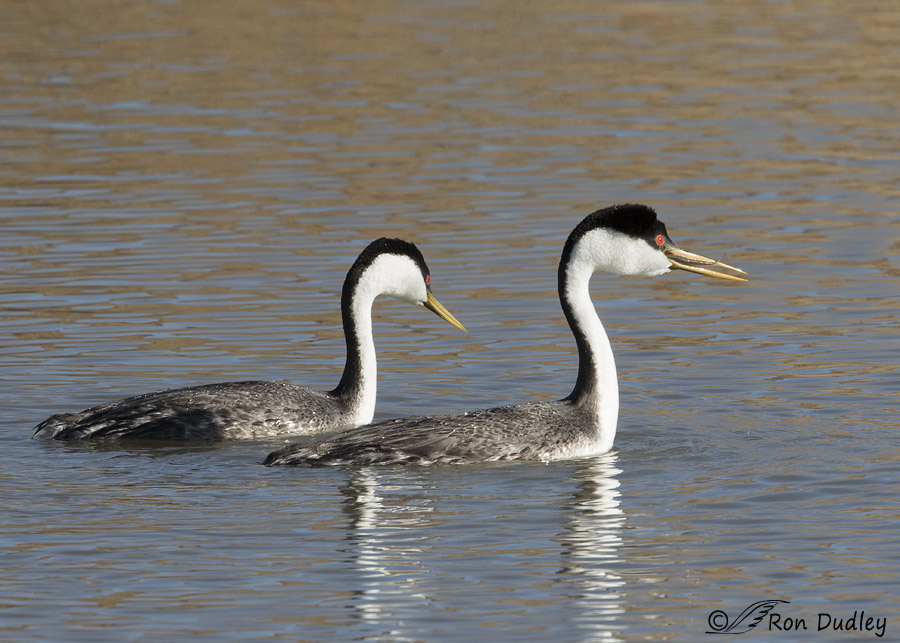
he’d gobble it down.
In the past every time I’ve seen mate feeding behavior the female has swallowed the fish almost immediately after delivery and I don’t believe there’s ever been any swapping of the food. This time the fish was passed back and forth between the two birds 6-8 times before the male finally swallowed it (instead of the female, which is typical). I have no idea why the fish was swapped so many times or why it was the male that ate it instead of the female. A wild guess might be that the female was already full from previous mate feedings but that’s nothing more than pure speculation.
Regular readers know that I’m fascinated by bird behaviors and when I observe something new and unexplained (to me at least) my curiosity often gets the best of me – to the point that I actually wish I could approach the birds and ask them “Why did you DO that?”
If only birds could talk…
Ron


That is interesting! Glad you showed the whole series.Oh there are so many interpretations that we humans could project upon them, from “not now dear, I am not interested” to “have some for yourself.” But the real treat is in the observation alone.Thanks for that.
I’ve heard of, and experienced, “dead fish” handshakes, but this takes things to new level…just not sure which direction…..(I LOVE Wally’s dialogue!!!)
HAHAHA! The last photo and sentence was very funny. 😀
Fantastic shots Ron! Maybe she didn’t like that kind of fish. LOL
Charlotte
I happened across a link to a post of yours, Ron, from June of 2012. You mentioned that occasionally two males will perform the “rushing” maneuver to attract the attention of a female (or females). I wonder if perhaps these two birds exchanging the fish back and forth could be young males who are practicing the routine that they will use at a later time to court a female.
It’s certainly possible and that could explain the behavior, Jeff. And I’m not positive that these two birds were male and female anyway.
Maybe she’s not really his mate . . . yet. Maybe he is trying to make her his mate . . . and she really thinks he is just a nerd, and rejecting his love fish.
Could be, Carolyn. After all, this is part of pair bonding behavior so perhaps the bond wasn’t yet entirely formed.
If only we could talk to the birds. I am sure we could have some very interesting conversations. Just two fellow creatures chattering away…
I can thing of so many questions I’d ask them, Mark…
Really interesting. Thank you for your unending curiosity and great eye, Ron!
Deborah, sometimes curiosity can be a bit of a pain. Occasionally it even keeps me awake as I try to solve some puzzle I’ve encountered in the field…
This is a most interesting behavioral observation. However, after reading Wally’s projected conversation I think I’m glad they can’t talk. At least we can hope the situation was better than that. I came up with a theory as to what was happening, but it probably wouldn’t be good to mention it…
You be the judge regarding mentioning your theory, Susan. Gotta admit I’m curious though…
Ron, my theory was tongue in cheek, but truly could be offensive to some, and I like this community, so I think I’ll go with Ralph’s explanation about this couple being newbies. That one works well for me. 🙂
Incredible observation and photos! : =)
Thank you, Dee.
Terrific series, Ron! That’s the great thing about Nature. Once we think we figure Her out, we find something different to wonder about.
If those birds could talk, it would sound like this:
“Here, Sweetheart, I brought you a delicious fish.”
“You know I hate fish.”
“But this one is special, just try it.”
“Looks like a fish, smells like a fish, yecch, tastes like a fish. Take it back.”
“It’s so fresh and shiny.”
“The only shiny thing I want is some bling. Did you see that foot bracelet Blanche is wearing? Now THAT’S shiny!”
“Well, if you’re sure you don’t want it. (Gulp.)”
“I can’t believe you ate my fish. You’ve never understood me.”
(On second thought, maybe it’s a good thing birds can’t talk.)
LOL, Wally, I LOVE your little grebe conversation! Perfect!
I need to enlist you to help me write my posts, Wally!!! Great conversation.
This was so much fun. Don’t we wish the birds could talk!!
I’m glad you enjoyed it, Ellen.
These images are great and that’s the reason why I keep my fingers crossed wishing that you will be able to catch that “Weed Ceremony” you told us about the other day.
(Did you get the message I sent to you yesterday?)
I’d like to get that entire weed ceremony, Jorge. Someday, perhaps.
Yes, I got the message but I’m still trying to open the link. Having troubles with it…
Great series Ron! Your documentation on bird behavior and the specifics and intricacies of individual species actions is outstanding. This should be tacked on to both the old Bent’s Life Histories and the newer Birds of North America series giving evidence to historical and factual documentation along with adding new and beneficial species information.
Thanks, Dick. Perhaps this variation of the behavior is well known by researchers but if it is I couldn’t find it.
Wow! Great Shots, Ron.
Thank you, Bill.